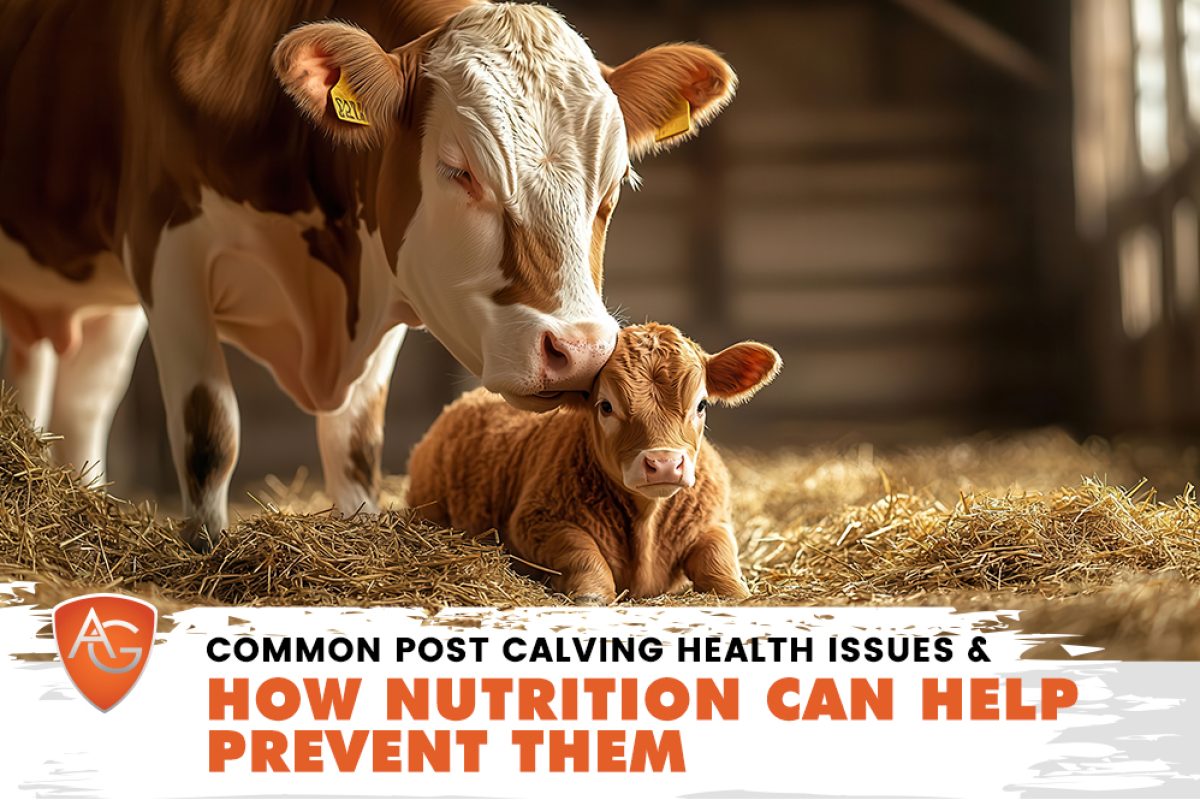Overview: Discover the most common health issues cows face after calving and how proper nutrition can help prevent complications. Keep your herd healthy with these essential feeding tips.
Calving season is one of the most critical times for any rancher. A successful birth is just the beginning — ensuring the cow recovers well and the calf thrives is just as important. Unfortunately, post-calving complications can arise, impacting both productivity and profitability.
The good news? A well-balanced nutrition plan can play a major role in preventing many of these issues.
Let’s dive into some of the most common post-calving health concerns and how proper feeding strategies can help keep your herd in top shape.
1. Milk Fever (Hypocalcemia)
Milk fever occurs when a cow experiences a sudden drop in blood calcium levels after calving, leading to muscle weakness, difficulty standing, and in severe cases, coma or death.
Prevention Through Nutrition:
Balanced Calcium & Phosphorus Levels: Avoid feeding high-calcium diets before calving. Instead, provide a diet rich in phosphorus and magnesium to help the cow mobilize calcium reserves when needed.
Post-Calving Calcium Supplementation: Adding calcium-rich feeds like alfalfa or using calcium boluses can prevent dangerous drops.
>> Related Reading: Milk Fever in Cows: Causes, Symptoms, and How to Prevent
2. Retained Placenta
A placenta that doesn’t pass within 24 hours post-calving can lead to infections and fertility issues.
Prevention Through Nutrition:
Boost Vitamin E & Selenium: These nutrients support immune function and uterine contractions, helping cows expel the placenta naturally. Consider adding mineral-rich hay blends or selenium-enriched supplements.
High-Quality Forage: Providing high-energy feed like alfalfa or orchard/brome/timothy mix ensures strong metabolic function and immune response.
Here’s a quick guide on >> Retained Placenta in Livestock: Causes, Treatment, and Management that might interest you!
3. Ketosis
Ketosis occurs when a cow burns too much body fat for energy due to insufficient glucose levels, leading to weakness, low appetite, and reduced milk production.
Prevention Through Nutrition:
Increase Energy Intake: High-energy forages like orchard/alfalfa mix and quality hay are essential to maintain body condition.
Feed High-Quality Fiber: Providing consistent, digestible fiber sources prevents digestive upsets and stabilizes blood sugar levels.
4. Metritis (Uterine Infection)
Metritis is a bacterial infection of the uterus that occurs after calving, often due to a retained placenta or difficult birth. Symptoms include fever, foul-smelling discharge, and decreased appetite.
Prevention Through Nutrition:
Support Immune Health: A well-balanced diet with adequate protein and minerals like zinc and copper promotes healing and disease resistance.
Encourage Gut Health: Probiotics and high-quality forage can enhance digestion and immune function, reducing the risk of infections.
5. Displaced Abomasum (DA)
A twisted stomach (DA) happens when the abomasum moves out of place due to gas buildup, often caused by reduced feed intake.
Prevention Through Nutrition:
Encourage Consistent Feed Intake: Feeding high-fiber hay like Wyoming Timothy/Garrison encourages rumen function and keeps the digestive system active.
Avoid Excess Grain: Too much grain can increase gas production, leading to digestive disturbances. Instead, balance energy sources with quality hay and forage.
Feeding for Long-Term Health & Productivity
A strong nutritional foundation is the best investment in herd health. By ensuring your cows receive the right balance of energy, protein, vitamins, and minerals, you can reduce post-calving complications, improve fertility, and boost overall productivity.
For high-quality hay options tailored to your herd’s needs, trust All Around Ag. Whether you need alfalfa for post-calving recovery or a balanced orchard/grass mix for steady nutrition, we’ve got you covered.
Contact us today to keep your herd thriving!
